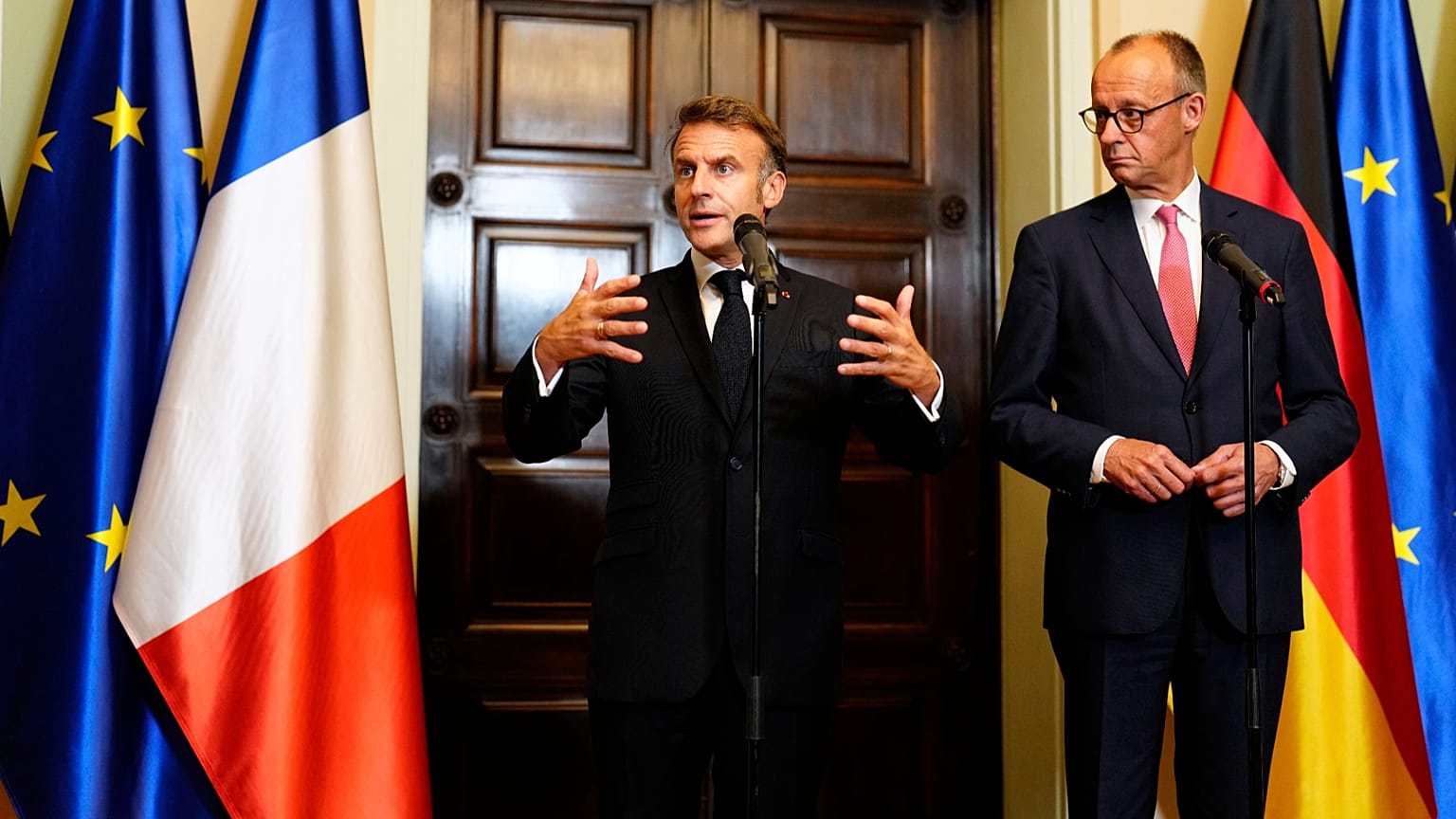Top Stories
France and Germany Push ‘Best Athlete’ Defense Model to Boost EU Security

UPDATE: France and Germany are set to kick off crucial discussions on a controversial “best athlete” model for European defense production, aiming to streamline military capabilities amid rising security concerns. This urgent meeting, scheduled for Friday, October 20, 2023, will see French President Emmanuel Macron and German leader Friedrich Merz address joint defense projects and the pressing need to enhance Europe’s military industrial base.
This proposal comes as EU member states scramble to bolster their defense capabilities in light of increasing threats, particularly from Russia. The fragmented nature of the defense sector, where many nations prioritize domestic industries, has hindered collective military readiness. The discussions will explore whether selecting a few “best athletes” in defense manufacturing could streamline production and improve interoperability among EU nations.
Officials indicated that the two leaders will assess the potential for a centralized approach to military equipment, aiming to reduce the myriad of weapons systems currently in operation. Currently, Europe employs at least four different fighter jets, including the Eurofighter Typhoon and the American-made F-35, complicating logistics and training for countries like Ukraine, which relies heavily on diverse military aid.
The Elysee Palace emphasized that achieving a “best athlete” system could significantly enhance the efficiency of the EU’s defense procurement process, stating, “The logic of the best athlete is to reduce the number of weapons systems in Europe.” However, this idea has raised concerns about sidelining smaller domestic defense companies, leading to fears of reduced competition and innovation in the sector.
With an estimated €6 billion in defense contracts expected to flow into the sector by 2030, the urgency to unify Europe’s defense strategy has never been greater. Macron’s previous advocacy for European defense preferences has already sparked tension among member states, with some fearing backlash from the United States and others worried about the implications for their own defense industries.
Experts are divided on the feasibility of this new model. Ester Sabatino, a research associate at the International Institute for Strategic Studies (IISS), noted that while adopting a “best athlete” model could streamline production, it might also limit the diversity of military equipment available to countries striving to develop their own defense capabilities.
The challenges are magnified by Poland’s substantial investments in U.S. and South Korean military technology, further complicating the landscape for a unified European defense strategy. Poland recently announced plans to acquire an additional 180 tanks from South Korea, reinforcing its commitment to bolstering its military.
As Macron and Merz prepare for their pivotal meeting, they will also address two significant programs: the Future Combat Air System (FCAS) and the Main Ground Combat System (MGCS). The FCAS project, which aims to develop a next-generation fighter jet, is currently embroiled in disputes over workshare agreements, with France’s Dassault demanding a predominant role.
Jacob Ross, a research fellow at the German Council on Foreign Relations, warned that the success of the FCAS project is critical. “If the project fails to go forward, it would send a fatal signal for Franco-German leadership in Europe regarding defense industrial cooperation,” Ross stated.
The path forward remains uncertain, with both leaders needing to cultivate a unified stance among EU member states to successfully advocate for the “best athlete” approach. The Elysee has cautioned that developing such a policy will require “extremely complex work,” highlighting the intricate nature of harmonizing defense needs across the continent.
As Europe grapples with the realities of contemporary security threats, the implications of these discussions could reshape the defense landscape for years to come. The outcome of Friday’s meeting may determine whether European nations can effectively collaborate to enhance their military capabilities or continue to struggle with fragmentation and inefficiency.
-

 Top Stories1 month ago
Top Stories1 month agoTributes Surge for 9-Year-Old Leon Briody After Cancer Battle
-

 Entertainment3 months ago
Entertainment3 months agoAimee Osbourne Joins Family for Emotional Tribute to Ozzy
-

 Politics3 months ago
Politics3 months agoDanny Healy-Rae Considers Complaint After Altercation with Garda
-

 Top Stories2 months ago
Top Stories2 months agoIreland Enjoys Summer Heat as Hurricane Erin Approaches Atlantic
-

 World3 months ago
World3 months agoHawaii Commemorates 80 Years Since Hiroshima Bombing with Ceremony
-

 Top Stories3 months ago
Top Stories3 months agoFianna Fáil TDs Urgently Consider Maire Geoghegan-Quinn for Presidency
-

 World3 months ago
World3 months agoGaza Aid Distribution Tragedy: 20 Killed Amid Ongoing Violence
-

 World3 months ago
World3 months agoCouple Convicted of Murdering Two-Year-Old Grandson in Wales
-

 Top Stories1 month ago
Top Stories1 month agoNewcastle West Woman Patricia Foley Found Safe After Urgent Search
-

 Top Stories2 months ago
Top Stories2 months agoHike Donegal’s Errigal Mountain NOW for Unforgettable Summer Views
-

 Top Stories2 months ago
Top Stories2 months agoClimbing Errigal: A Must-Do Summer Adventure in Donegal
-

 World3 months ago
World3 months agoAristocrat Constance Marten and Partner Convicted of Infant Murder









